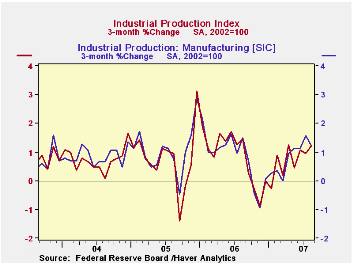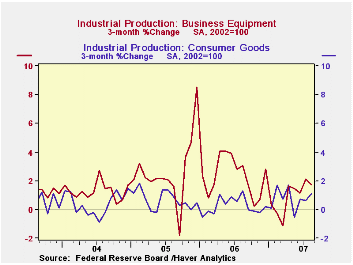 Global| Sep 14 2007
Global| Sep 14 2007U.S. Industrial Production Up An Expected 0.2%, But ...
by:Tom Moeller
|in:Economy in Brief
Summary
Industrial production rose an expected 0.2% following a little revised 0.5% July increase. The "But" in the headline, however, is due to a 0.3% decline in factory output. It followed a 0.8% gain which was upwardly revised only a bit [...]

Industrial production rose an expected 0.2% following a little revised 0.5% July increase.
The "But" in the headline, however, is due to a 0.3% decline in factory output. It followed a 0.8% gain which was upwardly revised only a bit from 0.6%. August was the first decline in factory output since February.
A 2.1% decline in the output of automotive products led the decline in manufacturing output last month. Output of business equipment also fell by 0.2% (+3.7 y/y) owing to declines in the production of industrial equipment as well as defense & space equipment.
Consumer goods output rose a modest 0.1% (2.0%) y/y). Production of computers & electronics fell 0.3% (+17.8 y/y) for the second month to month decline and the output of furniture & appliances fell 0.5% (-4.9% y/y). The big loser was production of apparel which fell by 1.8% (-2.6% y/y) though a larger drop in July was revised shallower. The main increase in the consumer goods area was by chemical products with a 0.8% rise?
Capacity utilization rose to 81.9%from 81.8% in June as capacity rose 0.1% (2.1% y/y).
Blazing temperatures throughout the country during August accounts for the 5.3% rise in utility output, mainly driving air conditioners.
How Accurate Are Real-Time Estimates of Output Trends and Gaps? from the Federal Reserve Bank of Richmond can be found here.
| INDUSTRIAL PRODUCTION (SA) | August | July | Y/Y | 2006 | 2005 | 2004 |
|---|---|---|---|---|---|---|
| Total | 0.2% | 0.5% | 1.7% | 4.0% | 3.2% | 2.5% |
| Manufacturing | -0.3% | 0.8% | 1.7% | 4.7% | 3.9% | 2.9% |
| Mining | -0.7% | 0.8% | 0.5% | 2.7% | -1.6% | -0.6% |
| Utilities | 5.3% | -1.6% | 2.3% | 0.2% | 2.0% | 1.4% |
Tom Moeller
AuthorMore in Author Profile »Prior to joining Haver Analytics in 2000, Mr. Moeller worked as the Economist at Chancellor Capital Management from 1985 to 1999. There, he developed comprehensive economic forecasts and interpreted economic data for equity and fixed income portfolio managers. Also at Chancellor, Mr. Moeller worked as an equity analyst and was responsible for researching and rating companies in the economically sensitive automobile and housing industries for investment in Chancellor’s equity portfolio. Prior to joining Chancellor, Mr. Moeller was an Economist at Citibank from 1979 to 1984. He also analyzed pricing behavior in the metals industry for the Council on Wage and Price Stability in Washington, D.C. In 1999, Mr. Moeller received the award for most accurate forecast from the Forecasters' Club of New York. From 1990 to 1992 he was President of the New York Association for Business Economists. Mr. Moeller earned an M.B.A. in Finance from Fordham University, where he graduated in 1987. He holds a Bachelor of Arts in Economics from George Washington University.
More Economy in Brief
 Global| Feb 05 2026
Global| Feb 05 2026Charts of the Week: Balanced Policy, Resilient Data and AI Narratives
by:Andrew Cates






